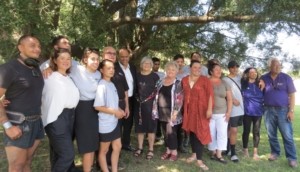
Among those welcoming Ka Hao te Rangatira were (from left) Rakairoa Beach, Tui Warmenhoven, Davie Boyce, Raiha Parata Blane, Hinemaurea Kaiwai, Te Runanganui o Ngati Porou chairman Selwyn Parata, Employment Minister Willie Jackson, Conservation Minister Eugenie Sage, Rua Te Kani, EIT Tairawhiti campus director Jan Mogford, Alamein Kaiwai, Tina Ngata, Joseph Tawhara, Charles Barrie (obscured), Marijke Warmenhoven, Arapeta Beach, Lisa Beach and DoC biodiversity ranger Joe Harawira.
A new environmental training programme being piloted near Ruatoria by EIT and various other agencies is giving young East Coast people a chance to come home and make a meaningful contribution to their community.
Arapeta Beach 17, originally from Tuparoa, and David Boyce 18, from Tokomaru Bay, are among the 10 students taking part in the inaugural six-month Ka Hao te Rangatahi programme.
Both were rapt about the opportunity to come home and were among nearly 30 people wanting to take part.
Arapeta went to high school in Gisborne and David to Naenae College in Wellington.
”We are learning how to look after the land and our trees and our awa (river),” said Arapeta.
“We are Maori and we want to give something back to the land and it’s good to come home.”
As well as learning basic land management skills, including native plant propagation, pest and disease control and riparian restoration work, the programme will teach them how to safely operate equipment such as quadbikes and chainsaws. As well they will learn about traditional medicinal uses of native plants (raroa).
“We will also be getting our learner driver licences and firearms licences,” said David.
The programme was formally launched last week by Conservation Minister Eugenie Sage and Employment Minister Willie Jackson at Te Heapara Marae.
EIT Tairāwhiti campus director Jan Mogford and Te Runanganui o Ngāti Porou chairman Selwyn Parata both thanked the Ministers for enabling the programme with funding through the Provincial Growth Fund.
They also acknowledged the many organisations backing it, including the Department of Conservation, the Ministry of Social Development, Ngā Whenua Rāhui, Te Puni Kokiri, Gisborne District Council and the Ministry of Business, Innovation and Employment.
Tributes was paid to Kia Ora Station, for providing the use of a covenanted forest as one of the programme’s key outdoor classrooms.
Jan Mogford said EIT had been working with the East coast community for 25 years but it was the first time there had been a programme targeted specifically at rangatahi.
She said the first students would be carrying the baton for what she hoped would be the first of many such programmes.
“I look forward to following your progress.”
Willie Jackson said all governments knew that something had to be done to turn around the negative statistics relating to young people and Maori.
“We are one our way,” he said.
Although it was only a small start, the programme was part of an important strategy to get things up and running.
“Some of these young people come from families on the drugs, or maybe have parents and grandparents who are unemployed.
“There are intergenerational problems and we can say they are because of colonisation but we can no longer use colonisation as an excuse. We can’t use it as a reason not to do anything.”
He told the students “we are backing you but you have to back yourselves.
“Stick to your Ngāti Porou side,” he said.
Eugenie Sage said the programme was one of the best initiatives her government had undertaken.
“Healing the whenua (land) is where it all starts and you the rangatahi are leading the way. It is one of the most important challenges this country faces.”
The students will receive wraparound pastoral support during their studies, and for the six months following it to best prepare them for jobs or further learning.
The next intake of students will be in July.
*The title Ka Hao te Rangatahi takes its name from the old Maori proverb “Ka pū te ruha, ka hao te rangatahi – The old net is cast aside and the new net goes fishing”.

